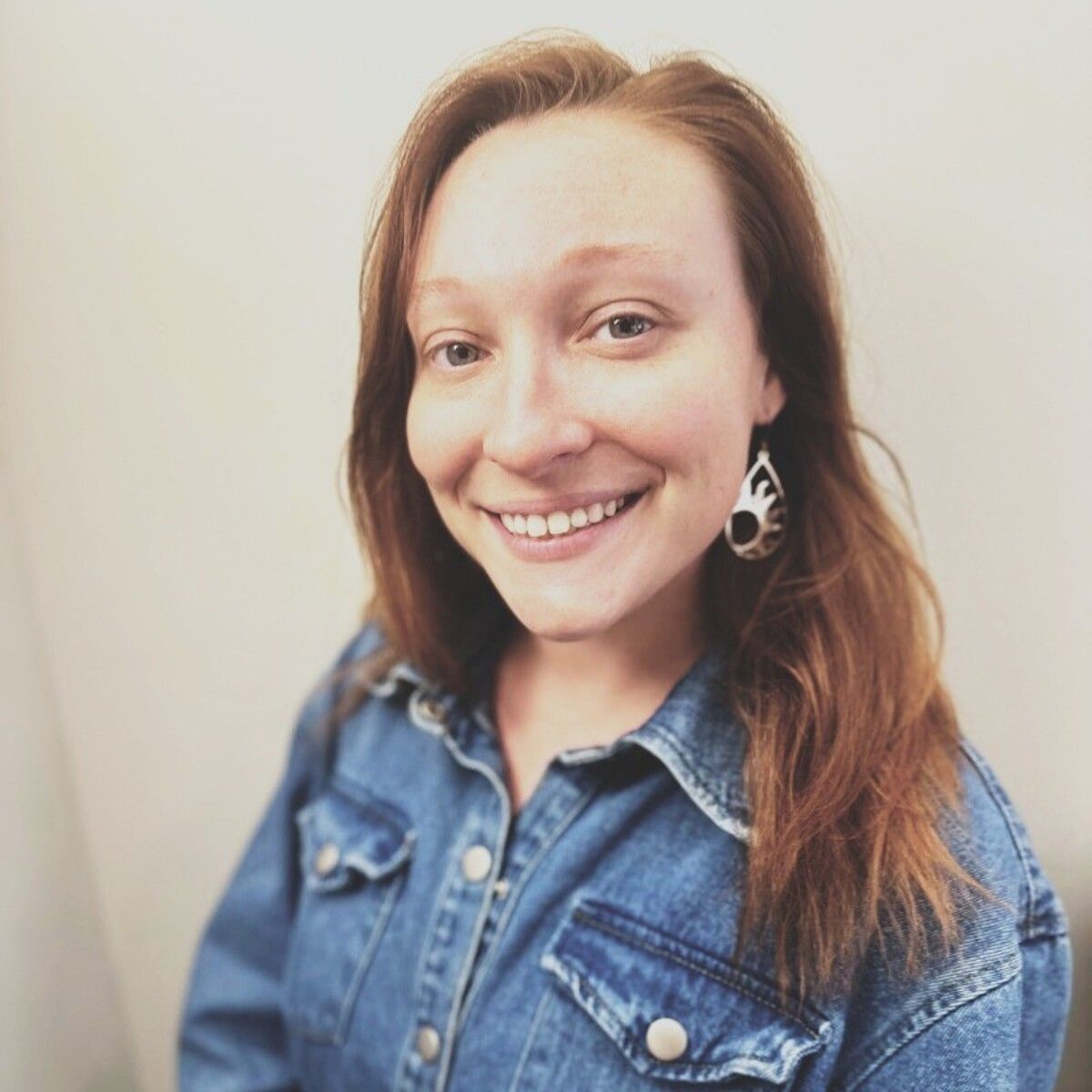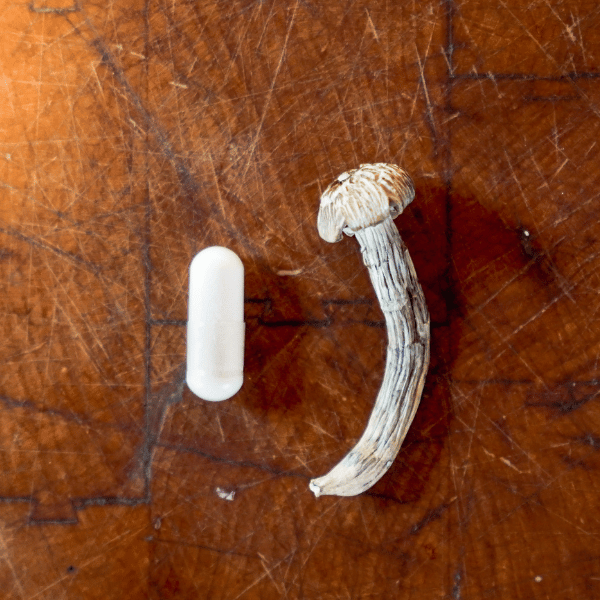Hi there 🍄
This week’s highlights a spotlight interview, ice-making fungi, and the world’s first fungi yogurt.
On self-advocacy and integrative healing with Sandra Statz of A.P. CHEM.
Sandra Statz is a beauty executive, chronic pain navigator, and psychedelic medicine advocate. She's the founder and CEO of A.P. CHEM®, a science-forward age decelerating skincare brand. An advocate for psychedelic medicine for mental and physical health, Statz actively contributes as a board member of The Ketamine Fund, a member of the marketing committee for the Women in Psychedelics Network, and as a confidante for those exploring treatment.
Writer Vivian Kanchian sat down with her to discuss Statz’s journey into self-advocacy through her autoimmune condition, psychedelic therapy, and A.P CHEM’s use of functional mushrooms.
Sandra Statz: I’m doing [psychedelic] sessions with this amazing woman in Brazil, and when we first started getting to know each other… she said to me, “Goddess, you need to stop. You keep apologizing for everything.” I was like, “I’m sorry.” [laughs]
It’s just natural [for me] to be deferential to people. It’s an auto-response. [But her words] really stuck with me. [And with psychedelics] you become so much more open-minded and considerate of yourself.
Vivian Kanchian: I’m curious if you think it’s a cultural thing… being deferential? I’m Armenian. And I grew up with a mother who even ironed our pajamas! Very proper and accommodating of others. I can’t help but wonder… is it a little bit of that for you, too?
SS: A hundred percent. The best way to describe my ethnicity is that I’m ethnically Indian, and culturally Caribbean. My parents grew up in a former British colony called Guyana in South America. So, that came with a mixture of British etiquette as well as being an immigrant coming to a country in the late 60s-early 70s, as a person of color.
You find yourself being a little timid, a little nervous. But going back to your question just about cultural influence, absolutely. I think for the most part, it’s a good thing. You’re learning manners, you’re learning respect, you’re learning your place when it comes to your age and what’s appropriate. Nothing annoys me more than an overly precocious child that interrupts adult conversations [laughs].
I think that [my upbringing] very much shaped my values and my respect for people. I’m always trying to make sure that I’m being polite, I’m being respectful, [and sometimes that includes being] deferential to people. But you kind of forget as you get older, that you don’t have to be deferential to everybody.
That was something that I learned going through ketamine treatment and microdosing. You learn there’s a difference between being apologetic, and being deferential and respectful.
VK: One of my favorite sayings these days is by the Welsh poet, David Whyte. He talks about arriving at an age in life when you “stop smiling politely and pouring tea for everybody,” a very British reference. The point is that you start living more authentically to yourself.
As a child of first-generation immigrants, I was taught to be accommodating. For example, if an aunt or an uncle wants to go in for a hug, you just do it.
SS: We share a lot of commonalities. They should do a study on first-generation Americans. I think there’s a lot to unpack! I’m not saying that the way that our parents raised us is negative by any means. They want to assimilate.
At the same time, they want to preserve their culture and their values. But it’s also, in some instances, contrary to assimilating. It’s complicated.
VK: So, we’ve talked about the cultural aspect. But I think that a lot of this tendency to apologize can sometimes be connected to being a woman, right?
I was talking with a retired OBGYN who had lost his wife to Parkinson's. And he was telling me how they just felt completely brushed off by the medical system. And that even he, as a doctor, found himself hurrying his patients through their appointments because of the system in which he was a part of.
So I wonder, based on the experiences that you've had with your autoimmune condition. Can you tell us a little bit about some times that you’ve had to self-advocate, and what would your advice would be to somebody who's facing a similar situation?
SS: Yes, absolutely. I felt dismissed a lot. I will also say, I was very apologetic. I think certainly, that my impulse to be respectful is something that was ingrained in me.
But I also think the doctors or the experts may not even realize that they're dismissing you. For the reasons that you mentioned with your doctor friend, they might end up seemingly dismissing you because of the system or because they're overworked and have 25 other patients that might (from their point of view) be in worse condition than you.
The big turnaround for me was when the symptoms I was experiencing rapidly got worse. I had to quickly change gears and start advocating for myself. And for me that meant well, okay, I've seen every specialist I can think of. And the rheumatologists were throwing medicine at me. They were just giving me the usual stuff, and it wasn't working. So, I would ask them if we should try something else.
What I would get in response was, “No, it takes a good six to 12 months before you really start to feel any better.” And from my perspective, it was like, “I'm in a shoulder brace. I have compression gloves on. I have a knee brace. I've got ankle braces. I can barely walk”. I mean, this happened in the span of six months.
I didn't have time anymore to wait for the medication to work. I didn't have the patience anymore to be in that much pain.
New study supports ancient psilocybin knowledge
A new study in the Journal of Psychedelic Studies from the University of Twente and Leiden University in the Netherlands looks beyond the therapeutic applications for psilocybin. Researchers examined psilocybin’s impact on healthy individuals and its influence on various components of well-being in order to understand the broader implications of psilocybin usage and the underlying mechanisms that cause these effects.
🧠 The methodology
The study investigated the impact of psilocybin on the well-being of healthy individuals by analyzing a broad range of peer-reviewed articles from major scientific databases. This comprehensive approach, spanning experimental to observational research, provided a thorough understanding of how psilocybin affects positive aspects of emotional and mental well-being in those without pre-existing mental health conditions.
💡 The results
Regardless of the diversity of study designs, objectives, and psilocybin dosages, the common finding in all observed studies was that the substance has a direct positive impact on the well-being of the majority of participants.
🌀 Psilocybin positively affected self-acceptance, leading to improved understanding of oneself and better relationships with others.
🕊️ Participants reported enhanced feelings of purpose and meaning in life, prompting a more reflective approach to existential questions.
🥰 Changes in brain function due to psilocybin use may foster emotional and cognitive growth in healthy people.
Around the web
❄ Imagine tiny fungi making magic dust that helps ice grow. A new study found out that one species has special proteins, like tiny building blocks called ice nucleators, that make it easier for ice to form. These same proteins are found in the animal kingdom, namely frogs who use them to regulate their temperature when sleeping icy conditions. The question now is: Why do fungi have ice nucleators at all?
📜 In Massachusetts, the move to legalize psilocybin with a potential ballot question for 2024 could move forward. Supporters have gathered over 95,000 signatures, more than the 74,000 required, for the petition to include statewide ballot questions related to using psilocybin for treating conditions like anxiety, depression, and PTSD.
🥄 Nature’s Fynd has launched the world's first fungi-based, dairy-free yogurt. Fy Yogurt is made from fungi originating from Yellowstone National Park and is now available at Whole Foods Market stores in the U.S. It delightfully comes in in strawberry, peach, and vanilla flavors, and doesn’t contain cow milk, nuts, oats, coconut milk, or soy.



